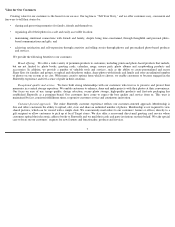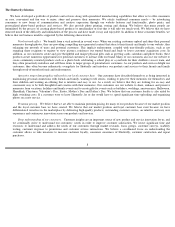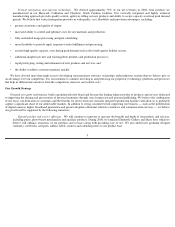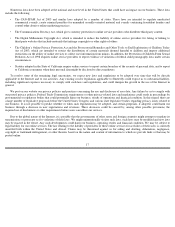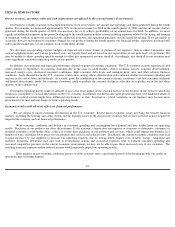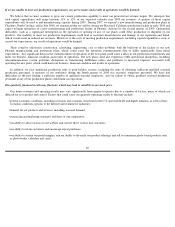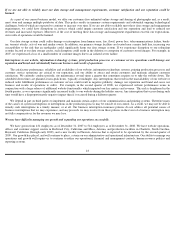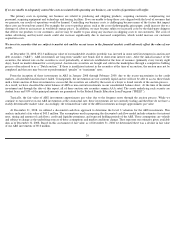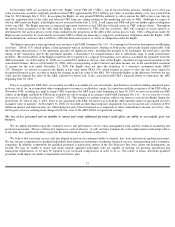Shutterfly 2009 Annual Report Download - page 19
Download and view the complete annual report
Please find page 19 of the 2009 Shutterfly annual report below. You can navigate through the pages in the report by either clicking on the pages listed below, or by using the keyword search tool below to find specific information within the annual report.
Numerous laws have been adopted at the national and state level in the United States that could have an impact on our business. These laws
include the following:
To resolve some of the remaining legal uncertainty, we expect new laws and regulations to be adopted over time that will be directly
applicable to the Internet and to our activities. Any existing or new legislation applicable to Shutterfly could expose us to substantial liability,
including significant expenses necessary to comply with such laws and regulations, and could dampen the growth in the use of the Internet in
general.
We post on our website our privacy policies and practices concerning the use and disclosure of user data. Any failure by us to comply with
our posted privacy policies, Federal Trade Commission requirements or other privacy-
related laws and regulations could result in proceedings by
governmental or regulatory bodies that could potentially harm our business, results of operations and financial condition. In this regard, there are
a large number of legislative proposals before the United States Congress and various state legislative bodies regarding privacy issues related to
our business. It is not possible to predict whether or when such legislation may be adopted, and certain proposals, if adopted, could harm our
business through a decrease in user registrations and revenues. These decreases could be caused by, among other possible provisions, the
required use of disclaimers or other requirements before users can utilize our services.
Due to the global nature of the Internet, it is possible that the governments of other states and foreign countries might attempt to regulate its
transmissions or prosecute us for violations of their laws. We might unintentionally violate such laws, such laws may be modified and new laws
may be enacted in the future. Any such developments could harm our business, operating results and financial condition. We may be subject to
legal liability for our online services. The law relating to the liability of providers of these online services for activities of their users is currently
unsettled both within the United States and abroad. Claims may be threatened against us for aiding and abetting, defamation, negligence,
copyright or trademark infringement, or other theories based on the nature and content of information to which we provide links or that may be
posted online.
•
The CAN-
SPAM Act of 2003 and similar laws adopted by a number of states. These laws are intended to regulate unsolicited
commercial e-mails, create criminal penalties for unmarked sexually-oriented material and e-
mails containing fraudulent headers and
control other abusive online marketing practices.
•
The Communications Decency Act, which gives statutory protection to online service providers who distribute third
-
party content.
•
The Digital Millennium Copyright Act, which is intended to reduce the liability of online service providers for listing or linking to
third
-
party websites that include materials that infringe copyrights or other rights of others.
•
The Children
’
s Online Privacy Protection Act and the Prosecutorial Remedies and Other Tools to End Exploitation of Children Today
Act of 2003, which are intended to restrict the distribution of certain materials deemed harmful to children and impose additional
restrictions on the ability of online services to collect user information from minors. In addition, the Protection of Children From Sexual
Predators Act of 1998 requires online service providers to report evidence of violations of federal child pornography laws under certain
circumstances.
•
Statutes adopted in the State of California require online services to report certain breaches of the security of personal data, and to report
to California consumers when their personal data might be disclosed to direct marketers.
17


